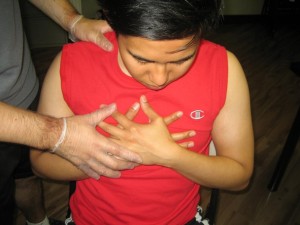Wheezing is a high-pitched, whistle-like sound that arises during breathing. In some cases, it can only be heard using a stethoscope but it is not uncommon for it to be heard by the naked ear.
The tone might vary depending on the part of the respiratory system that is narrowed or obstructed. The narrowing in the upper respiratory system might cause a hoarse wheeze. As for lower obstructions, it might have a “musical” note.

Even though it is often due to narrowing or obstruction of the small bronchial tubes, it might also be brought about by an obstacle in the larger airways or vocal chords. Wheezing is evident as an individual exhale but can also be heard while inhaling.
Who are at risk?
Anyone can develop wheezing. Children diagnosed with asthma often have the symptom.
Among infants, it is common which is due to their smaller airways. In addition, children below 2 years of age are prone to a common but readily treatable condition specifically bronchiolitis.
Among adults, those who smoke and diagnosed with emphysema and heart failure are at higher risk to develop wheezing.
What are the causes?
The causes of wheezing tend to vary widely and can range from asthma and heart failure. The usual causes include:
- Bronchitis
- Asthma
- Smoking
- Heart failure
- Emphysema
- Bronchiolitis
- Pneumonia
- Aspiration of a foreign object into the lungs
- Anaphylaxis from foods or stinging insects
Management of wheezing
The treatment is based on the underlying cause. Prompt treatment might include supplemental oxygen to help with breathing. Some individuals might require hospitalization until the breathing improves.
If the cause is asthma, an inhaler is prescribed to alleviate the inflammation and open the airways. Generally, inhaled corticosteroids and anti-inflammatory medications are given to manage asthma.
In case bronchitis is the cause, a bronchodilator might be given or an antibiotic to fight the bacterial infection.
More Information / Disclaimer
The information posted on this page on wheezing is for learning purposes only. Learn about the causes of wheezing by taking a standard first aid course with Missisauga First Aid.
